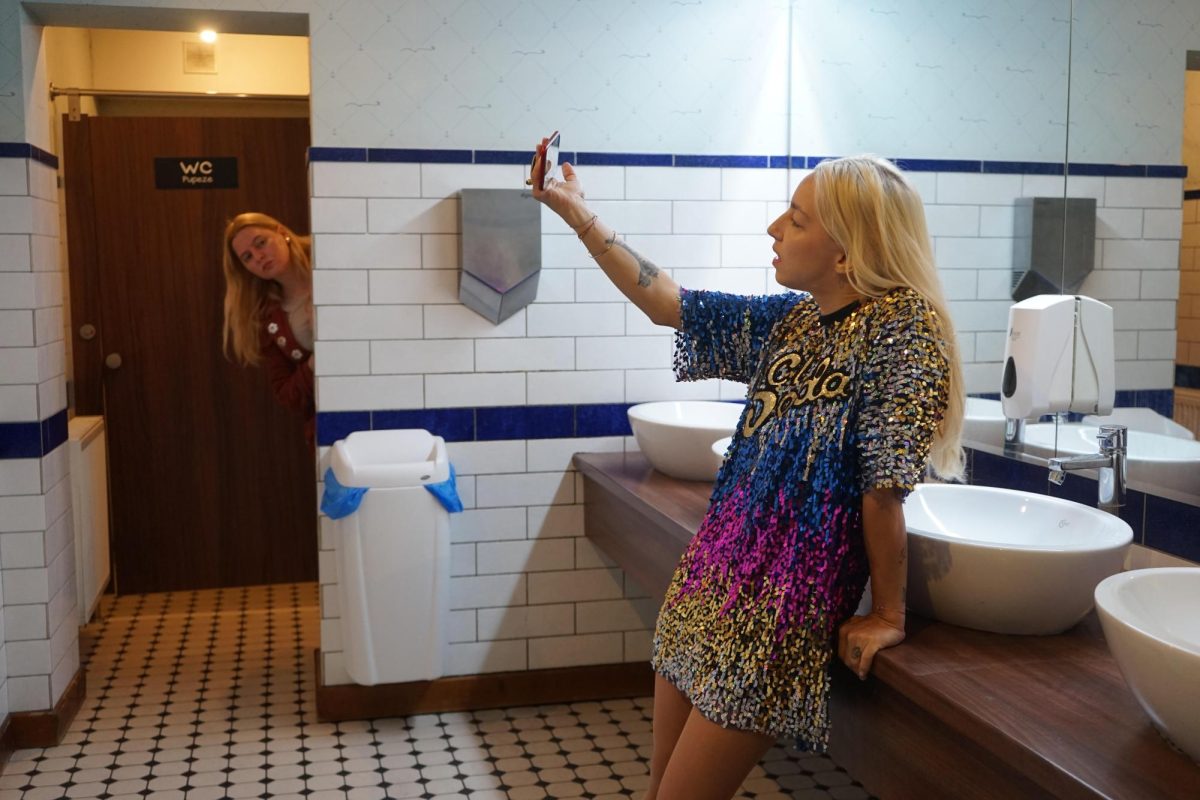In “Do Not Expect Too Much From the End of the World,” Romanian filmmaker Radu Jude’s latest satirical comedy, the reality of late-stage capitalism is depicted as a pendulum swung too far. Through the character of Angela (Ilinca Manolache) and her meaningless duties as an underpaid, overworked production assistant for a multinational corporation, Jude satirically portrays a working day in the entertainment industry as a hilarious, nightmarish odyssey.
The film’s first section, shot entirely in tepid black-and-white, covers Angela’s drive around Bucharest auditioning injured employees for their chance at a role in an instructional work-safety video. Angela’s growing duties and crude personality set up a bitingly ironic tone which carries a film full of sharp cultural criticism and ridiculously compromising scenarios for its characters.
Jude has proven himself as one of the most apt satirists when it comes to dissecting our modern technological and societal maladies, and this film is no exception. His most recent feature “Bad Luck Banging or Loony Porn” won him international acclaim and the Golden Bear at the Berlin International Film Festival in 2021. Where “Bad Luck Banging” used a leaked sex tape to anatomize contentious public views on gender and sexuality, Jude uses Angela’s work experiences in his newest film to illustrate the nonsensical traffic of an angry, over-stimulated Romanian populace.
Angela also has an Instagram alter ego, Bobita — who shares an uncanny resemblance to Romania’s own Andrew Tate. Her videos are vulgar and profane, often describing lewd sexual acts or cursing out Romania’s culture at large. She likens her social commentary to that of Charlie Hebdo, explaining at one point “I criticize by way of extreme characterization.” The integral use of social media, like Instagram and TikTok, serves as an outlet for Angela’s societal disdain and exaggeration of the extremist nature of our online personas.
Filled to the brim with a barrage of modern references, Jude’s film has the rarity — even among more recent films — of feeling both culturally and technologically modern. It’s unique that a director can translate society’s complex relationship with technology so seamlessly into a narrative.
Jude’s satire in “Do Not Expect Too Much From the End of the World” never feels tired or contrived, in part due to the naturalism, both in its performances and style. The absurdity of corporate greed is heightened without ever falling into the trap of forced caricature. Billboards and signage around the city give Bucharest an existential atmosphere, including a handless wall clock found in an employee’s home with a sign reading “it’s later than you think.” A supporting cast of Ovidiu Pîrsan, Dorina Lazar, and Nina Hoss all play their roles with humorous blasé, characters who tacitly participate in a world turned increasingly inane.
Interspersed within Angela’s commute are excerpts from Lucian Bratu’s 1981 film “Angela Goes On,” a forgotten, communist-era drama centered around another character named Angela, this one a middle-aged taxi driver dealing with the mundane nature of working life. Through the juxtaposition of the two Angelas’ individual experiences driving through Bucharest, Jude sets up a vivid cultural contrast.
As Jude’s Angela weaves through a disorganized congestion of vehicles, encountering angry drivers and self-involved citizens, Bratu’s Angela glides through the streets, experiencing fulfilling interactions with passengers and strangers alike.
In all its satirical criticism, Jude’s latest film is also about images. It explores how cinema and visual storytelling have drastically evolved over 40 years. The film oscillates between 35mm celluloid in “Angela Goes On,” and our modern-day Angela shot in an amateurish 15mm black-and-white. With the iPhone camera and Instagram filter of Bobita, Jude seemingly tracks the increasing personalization and accessibility of modern filmmaking. Jude paints this artistic freedom in tandem with a newfound economic freedom in Romania and around the world. With an abundance of access at our fingertips, Jude makes viewers consider whether we truly are at risk of suffocating ourselves with an excess of content.
Jude’s film plays like a warped mirror, reflecting a culture so eager to commodify creativity, regurgitate intellectual property and produce art devoid of any real humanity. It can feel at times both exhausting and revelatory. As we watch Angela’s abysmal day prolong with increasingly futile responsibilities, one can’t help but feel its resonance in the wake of last year’s historic labor strikes in Hollywood. As artists and workers are forced to saddle up against AI, corporate greed and rising costs of living, “Do Not Expect Too Much From the End of the World” serves as a poignant and hilarious portrait of how absurd the world has truly become.
Contact Nolan Morris at [email protected].























































































































































